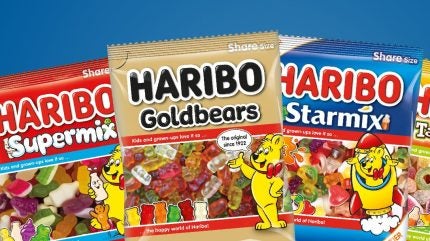[ad_1]

A handful of global confectionery and snacks giants, including Mondelez International and PepsiCo, have been pulled up for their record on TV advertising of unhealthy foods in the UK.
The two companies, along with Mars, Haribo and Kellanova, were identified as accounting for 80% of all the TV advertising of confectionery and snacks before the 9pm watershed, when children are likely to be viewing before bedtime.
London-based charity The Food Foundation, which campaigns for healthy diets, reported that those five manufacturers were among the 13 food and beverage companies advertising so-called HFSS products in the 5:30am to 9pm zone.
That is a time period when “children are more likely to watch TV”, the Foundation said in its annual State of the Nation’s Food Industry report for 2024, adding that Haribo and Mars were the biggest culprits among the five standouts – 25% and 20%, respectively, in terms of the share of adverts concerned.
The data was provided by the University of Liverpool but was based on an analysis from July to August 2022. That preceded the change of government in the UK, although Labour leader Sir Keir Starmer has pledged, among the party’s key mandates, to stamp out advertising of so-called junk foods.
During its reign, the Conservative Party had pushed back a ban on the advertising of junk, or unhealthy foods, before the watershed threshold to October 2025, as the cost-of-living crunch took hold.
Access the most comprehensive Company Profiles
on the market, powered by GlobalData. Save hours of research. Gain competitive edge.

Company Profile – free
sample
Your download email will arrive shortly
We are confident about the
unique
quality of our Company Profiles. However, we want you to make the most
beneficial
decision for your business, so we offer a free sample that you can download by
submitting the below form
By GlobalData
Rules banning multi-buy deals on foods and drinks high in fat, salt, or sugar (HFSS), including buy-one-get-one-free deals, were also delayed until that time.
It did, however, implement a ban on displays of unhealthy foods at retailer checkouts and end-of-aisle promotions in 2023 amid a general push in the UK to cut obesity rates, particularly in children.
Labour has said it will honour those October 2025 commitments.
Rebecca Tobi, the senior business and investor engagement manager at The Food Foundation, urged the Labour government to take up the baton.
“If we are to have any chance of ensuring the next generation are the healthiest ever – as Labour have pledged – then we simply can’t continue to ignore the major role large food companies are playing in shaping UK diets.
“We urgently need the government to introduce regulation to raise standards and create a level playing field that enables progressive businesses to go further, faster.”
The Food Foundation suggested the five confectionery and snacks companies pulled up in the report have marketing policies not to advertise products to children but claimed those same policies were not being honoured.
It noted: “The discrepancy between these company commitments and the large number of ads aired before the watershed suggests there is a disconnect between their marketing policies and what happens in practice.
“Even where ads or media are not explicitly targeting children, the timing of these adverts coincides with those times when children are more likely to be watching TV and are likely to be exposing children to HFSS product advertising.”
Manufacturers respond
Just Food asked the five major confectionery and snacks producers cited in the report to comment on the two-year-old data.
Haribo coined its response with respect to a recent comment from the UK food industry body, the Food and Drink Federation, of which it is a member.
“Our industry adheres to all advertising rules, including those which restrict the advertising of less healthy food around children’s media. Companies are also preparing for further regulations that come into effect in October 2025.
“We’re calling for government and regulators to move swiftly to publish the regulations and industry guidance so that we have sufficient time to prepare.”
Mars said via a UK spokesperson: “We understand the responsibility we have to help our consumers enjoy our products as part of a healthy and balanced diet. A key part of this is our commitment to young people.
“Our Q3 2022 audit results for UK TV show that we were 99.2% compliant with our audience threshold commitment.”
A spokesperson for Kellanova acknowledged the data in the report is “outdated” and that the company is “fully committed to the responsible marketing of our foods”.
Kellanova added: “As of January 2023, TV and digital advertising for our brands, such as Kellogg’s and Pringles, is for an over 16 target audience. This means that we don’t advertise high fat, high sugar, high salt foods on TV to under 16s.”
Baroness Walmsley, the chair of the House of Lords Food Diet and Obesity Committee, was cited by the Foundation as saying: “The government should act now to develop a long-term strategy to fix our food system, underpinned by a new legislative framework.
“Without it, businesses have insufficient incentive to act in the public interest and will continue to cause harm with their relentless promotion of junk food.”
[ad_2]

